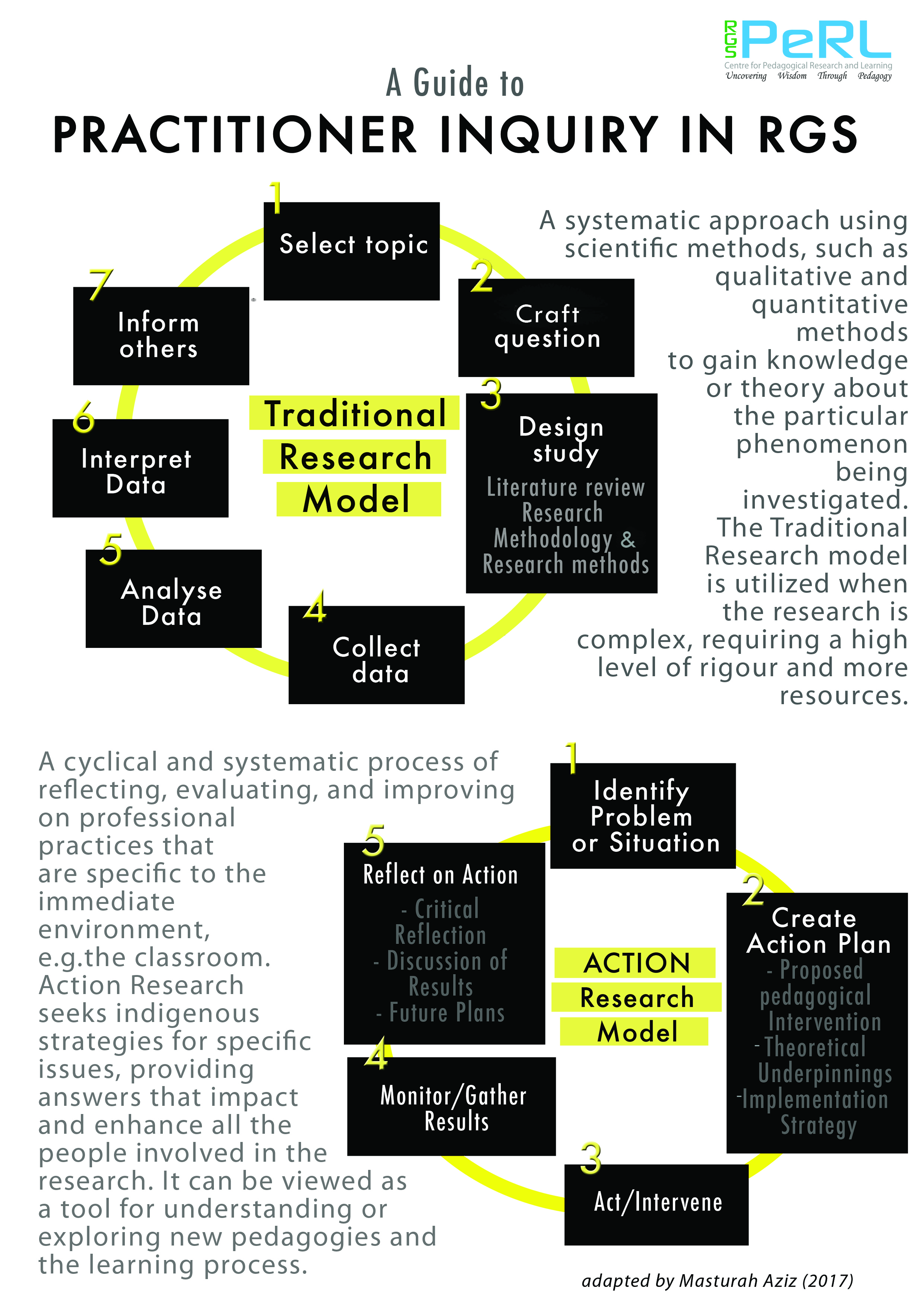Overview
Research in RGS
The PeRL Research Academy steers educational research in RGS. As a research office, it monitors research standards and ethics, providing the infrastructure for reflective practice for staff.
All staff who embark on research are required to submit the RGS Research Plan in which they indicate the research purpose, design and methodology.
The RGS Research Academy Handbook provides information and guidelines for all research-related information, which includes the following:
-
Research Integrity Policy and Procedures, pg 8
-
Information regarding Data Collection in RGS, pg 27
-
RGS PeRL Authorship Guidelines, pg 28
-
Role of Teachers & Specialists, pg 35
-
Singapore Statement of Research Integrity, pg 38
-
Informed consent to participate in a research study, pg 41
Research Categories
Research in RGS consists of 2 categories: School-Wide Research and Practitioner Inquiry. The info-graphic below describes Practitioner Inquiry in RGS.

School-Wide Research Projects
PeRL-conducted School-Wide Research focuses on:
-
Curriculum design
-
Instructional approaches
-
Assessment
-
Professional Practice
The following projects were conducted by the PeRL Research team:
1 . Insights from Teachers’ Perspectives on Blended Learning in a Secondary School in Singapore: An Exploratory Study
Impact: This study supports the school-wide adoption of the Blended Learning pedagogical approach and the findings inform the school’s professional learning plans. Findings from this case study have shown that teachers have a strong and positive mindset towards Blended Learning. The findings also sheds light on the areas of strength and areas for growth in teacher readiness for Blended Learning. Recommendations are put forth to address the challenges faced by teachers.
2. The Role of a Professional Learning Community in Informing Teacher Practice: A Case Study in Raffles Girls School (2016 - 2018)
Impact: The research on the professional learning community in RGS, known as the Professional Learning Space (PLS), showed that the PLS has the strongest effect in developing teachers' assessment literacy and curriculum design knowledge and skills. However, the findings also highlighted the untapped potential of the PLS, such as in addressing student learning needs through collective review of practices and facilitating teachers' responsiveness to student learning. Based on the findings, the investigators are actively engaging members of the staff to leverage the PLS for more review practices which center on the evidence of student learning, such as through the sharing of knowledge gained from practitioner inquiry, discussing classroom practices with a student-centered perspective, and utilizing student data to support classroom decision-making.
More information about PeRL-conducted School-Wide Research can be found here.
Practitioner Inquiry Projects
Teachers in RGS embark on Practitioner Inquiry projects to inform their practice across diverse areas of disciplines and interests. There are protocols to guide teachers embarking on Practitioner Inquiry projects and a PeRL member is attached to each project to ensure that the teacher-researcher's needs are met throughout the duration of the project.
The following are examples of Practitioner Inquiry projects that have been completed by RGS teachers:
1 . Mathematics Comprehension: Engaging students in Thinking about Mathematics (2021)
Benefit to Practice: In learning mathematics, the ability to read and comprehend mathematical content materials is an essential skill to deepen conceptual understanding, enable effective problem solving and support independent learning. The findings illuminate the effects of building mathematical comprehension skills on students’ attitudes towards Mathematics learning.
2 . Music, of Cause! Giving students a voice within and beyond the classroom (2014)
Benefit to Practice: The research allowed for a more rigorous use of data / feedback (students, staff and SD team) in evaluating the RICE Programme. Conclusions provide targeted focus on what went well, the key areas to be improved and recommendations for RICE 2015.
3. The Value of Class Participation as an Assessment Tool in the English Language Classroom (2013)
Benefit to Practice: Our investigative team was awarded the ELIS Research Fund. Embarking on a Practitioner Inquiry honed our skills in classroom research. The opportunity to present our findings at the ELIS Conference 2015 was priceless. The discussions with fellow educators on how we could further refine our existing assessment practices were truly enriching.
The list of Practitioner Inquiry projects conducted over the past five years can be found here.

